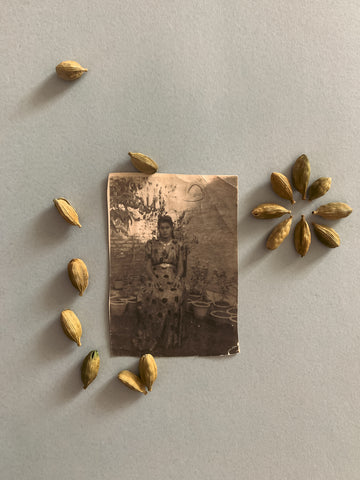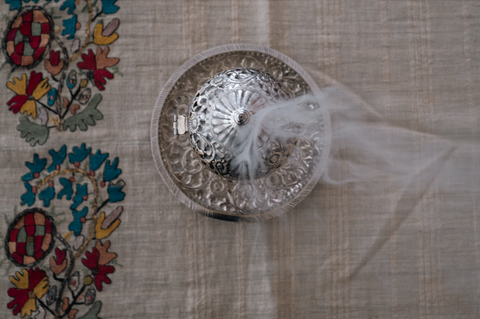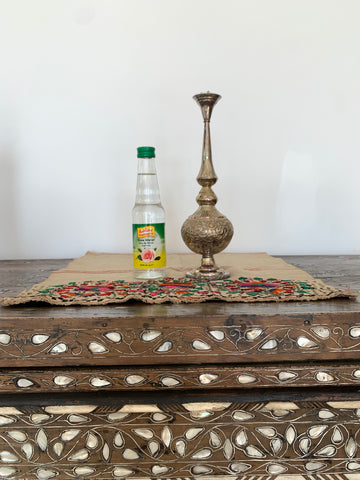https://garlandmag.com/article/the-culture-we-breathe/
It started with an incense burner my late aunt Hessah had gifted me, one of the dozens of burners she had hoarded and hid in the deep corners of her home. The object was small - it could easily fit into my hand - made of average quality ceramic, and tastefully decorated with geometric patterns. I immediately took a liking to it - its size, feel, appearance and provenance; it came from Yemen, a place I loved.

It took me a while to realize that many of the memories I associate with Kuwait involve not places, but smells. The scent of cardamom and cloves in the morning tea. The smell of rose water on freshly laundered cotton. The smell of our childhood skating rink. The overwhelming odor of ‘oud in wedding and funeral halls. Smells pervaded all sorts of daily and ceremonial rituals, giving the place a rich olfactory identity. Ephemeral though they were, these smells lingered deeply into the cavities of the mind, gently building our memory banks, and - like an invisible hand - binding communities together.
There is much culture in this ephemeral world, it transports us, forces us to slow down, contemplate. Heat is part of the magic - it brings out the scents hidden within, bestows upon a piece of wood, a ball of resin or a rose great powers. So powerful were these scents that they were said to transport prayers and messages to the gods. The process of smelling takes time. Patience is part of the ritual. Waiting for the aromatics to burn, for the aromas to form. Perhaps it is because of the slow burn that the memories have time to form, they seep in, linger, and never fully abandon you.

Smells are like childhood friends; whether good or bad, you rarely forget them. Once in a while an encounter reminds you of them. Some are intoxicating - you never get enough of them - while others are best kept at bay. Over time, people take on a patina that we associate with certain smells, like my aunt’s singular scent - a mix of soap, cardamom, ‘oud, and Chanel no.19. It somehow brought me closer to her, creating a familiar space of sorts.
We often associate culture with the visual, material, monumental. You can first of all see it, touch it. It is a testament to human prowess and - often masculine - heroic feats. The Arc de Triomphe, the column of Traiano, the Colosseum. History and culture made of stone. There is a gravitas - heaviness - to it, it takes up space, has eternal presence. In the Arabic language, the word for smell (ra’iha) stems from the root word rah, the masculine past tense of to leave: he left. In the same family of words, you will find soul (roh), spirituality (rohaniya), wind (rih) and rest (raaha).These words evoke lightness. Smells come and go, wafting in and out of one’s nostrils; they are fleeting, evasive, a whirlwind of molecules waiting to be intercepted.
Everyone has a story of smell. Those that build bonds between people, others that develop ties to places. Childhood memories sprinkled with the scent of rose water. A grandmother’s secret perfume recipe. The scent of Eid in people’s homes. The unpleasant stench of the meat market. The smell of the first rain. Smell is a book of memories, a language in and of itself - to quote Nizar Qabbani. Much of this richness remains embodied, passed down from mother to daughter, father to son.

So too is the process of scent creation. Knowledge around scent creation is the fruit of decades of sourcing, mixing, and smelling. There are no hard recipes; the magical mix depends on the ingredients at hand, the mood, the temperature, and the nose. I remember when my sister was doing research for a cookbook on Gulf cuisine, she embedded herself in my aunt’s kitchen for months to learn the recipes - it was the only way to learn.
In Kuwait, and probably many of the Gulf countries. one can still find scent artisans practicing their craft from home. In the olden days, most households made their own perfumes and mixed their own aromatics. It was a woman’s job, and mothers and daughters usually prepared the recipes together in the outdoor kitchen of the courtyard house. In the 1960s, Kuwait’s economy drastically changed and the market was flooded with perfumes from Europe. Women no longer needed to make their own perfume and many adopted the finest European scents. Still, a few stuck to the tradition.
Discretion was and remains very much part of the culture. I have learned of scent artisans through friends indirectly. Approaching someone with the hope of extracting knowledge - even if the reason seems noble - is a very delicate issue. Few of the older generation are keen to open up to strangers. It is an uncomfortable request. The knowledge they keep within themselves is part of their story, to be shared among friends and family, not strangers. It is also a way to protect it from the endless cycle of commodification - of recipes, stories, scents.
For the artisans at heart, making perfumes or an incense mix is like writing poetry, it is an art form. It takes time and inspiration. It is for the few in the know, those who have a nose for quality. In a delightfully anti-capitalistic manner, they shun replicability, scaleability. Only a handful of people receive this bounty. Many artisans of scent work out of their homes, with a dedicated room - a perfume room, not a lab. They source the ingredients from contacts they have built over a lifetime, many spread out across the Indian ocean. They know their musk, their ambergris, the fake from the real. Understanding that these aromatics are endangered and rare is also part of their ethic. Each batch is unique, there is no standardization. Theirs is a labor of love, and the rewards go beyond the material.
I’m not sure how much longer this anachronistic world will last. Much of its survival is related to the Gulf’s unique DNA - small socially cohesive populations. Still, to this day, the culture we breathe harks back to a different era. Some remnants survive, but just. Buttressed by the older generation, social capital is still high and the sense of community is strong. Mutual aid remains a pillar of society. Women, of course, are at the center of this world. I never once purchased ‘oud from the market - my late aunt wouldn’t hear of it. However, I could neither ask her for her source nor for ‘oud directly. I had to allude to the fact that my stash had finished and that I was at a loss for where to get some. She would quietly nod her head. The very next day I would be gifted a handsome stash of my favorite aromatic - to be used wisely I would be told.


